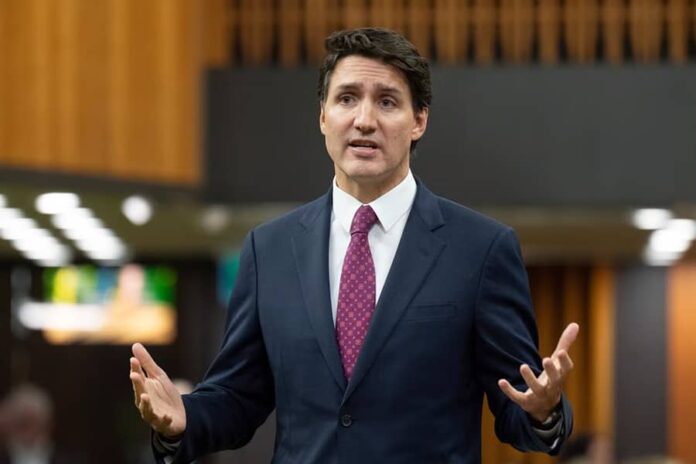During a recent dinner, Prime Minister Justin Trudeau warned Donald Trump that if he goes ahead with his plan to impose hefty tariffs on Canadian goods, it would also hit Americans hard.
This insight came from Canadian Public Safety Minister Dominic LeBlanc, who was present at the dinner.
Trump has been vocal about his desire to impose tariffs on products from Canada and Mexico unless they curb what he describes as the influx of drugs and migrants crossing into the U.S. He even mentioned on social media last week that he might slap a 25% tax on all imports from these countries right off the bat.
LeBlanc shared that Trudeau initiated this meeting to persuade Trump that the situation at the northern border is quite different from what’s happening at the southern border with Mexico.
While Trudeau emphasized protecting Canada’s economy and jobs from these tariffs, he also pointed out to their American counterparts how such measures could negatively impact their own economy and make life more expensive for American families.
If Trump indeed follows through with those 25% tariffs on imports from Canada and Mexico, it could lead to significant price hikes in everyday items like food, clothing, cars, and alcohol—something that would contradict his promise to ease inflation for American households.
Economists warn that businesses will likely have no choice but to pass these costs onto consumers.
Additionally, a trade group called the Produce Distributors Association recently stated that these tariffs would drive up prices for fresh produce while also hurting U.S. farmers if Canada retaliates.
In fact, Canada is already looking into potential counter-tariffs on specific U.S. products if Trump moves forward with his threats.
After having dinner with Trump, Trudeau headed home without any guarantees that the president-elect would ease off on his proposed tariffs affecting all products from Canada. While Trump described their discussions as productive, he didn’t back down from a commitment that Canada argues unfairly associates it with Mexico regarding issues related to drugs and migration into the U.S.
The notion that we came away empty-handed is simply not true, LeBlanc stated. We had a really fruitful conversation with Mr. Trump and his future Cabinet members…
The commitment from Mr. Trump to keep collaborating with us was definitely not empty. Alongside Trump and Trudeau at dinner were Howard Lutnick, who’s been nominated for commerce secretary, North Dakota Governor Doug Burgum, who’s set to head the Interior Department, and Mike Waltz, who’s chosen to be national security adviser.
Canada’s ambassador to the U.S., Kirsten Hillman, shared with The Associated Press on Sunday that they clearly conveyed how different Canada’s border is compared to Mexico’s.
Sitting at a nearby table during the dinner, Hillman emphasized that Canada isn’t part of the problem when it comes to drugs and migration issues.
On Monday, the president of Mexico pushed back against some comments that were made. Claudia Sheinbaum emphasized that Mexico deserves respect, especially from its trade partners.
She pointed out that Canada has its own issues with fentanyl use and suggested they could only dream of having the cultural wealth that Mexico possesses. When it comes to migrant flows and drug seizures at the borders, there’s a huge disparity.
Last year, U.S. customs officials confiscated 43 pounds of fentanyl at the Canadian border, while a staggering 21,100 pounds were seized at the Mexican border.
Most of the fentanyl entering the U.S.—which is linked to around 70,000 overdose deaths each year—is produced by Mexican drug cartels using chemicals smuggled in from Asia.
On the immigration front, U.S. Border Patrol reported encountering 1.53 million migrants at the southwest border with Mexico between October 2023 and September 2024.
In contrast, there were only about 23,721 encounters at the Canadian border during that same period. Canada is a major export destination for 36 states in the U.S., with nearly $3.6 billion Canadian (about $2.7 billion USD) worth of goods crossing their border daily.
Roughly 60% of crude oil imports to the U.S. come from Canada, along with 85% of electricity imports too! Plus, Canada is also America’s largest supplier of steel, aluminum, and uranium and has a wealth of critical minerals and metals that are crucial for national security—something that has caught Pentagon attention and investment.
